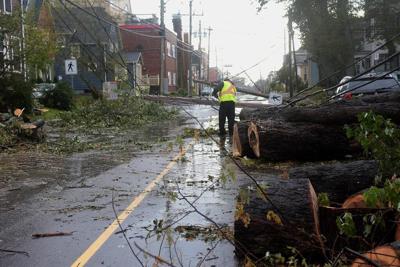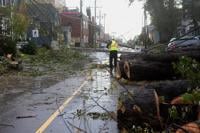CHARLOTTETOWN - A new report says P.E.I.'s response last year to post-tropical storm Fiona was hindered by exhausted staff, a poorly informed public and resources that were stretched thin during the most costly extreme weather event to hit Atlantic Canada.
When the powerful storm slammed into the island on Sept. 24, 2022, winds gusting at up to 149 kilometres per hour toppled trees, damaged homes, destroyed wharves and knocked out electricity and communications for almost all of the province's homes and businesses.
The 51-page report, prepared by Ottawa-based Calian Group Ltd., found that, in general, the island's response was well co-ordinated. But the report makes it clear that government departments, agencies and their partners could have done a better job.
As power outages dragged on until late October 2022, for example, the province's response started to show strain as emergency staff began to tire. The report found that the province's Emergency Measures Organization (EMO) and some partner agencies did not have enough staff to deal with an emergency of Fiona's magnitude.
"It was noted in many of the focus groups and interviews that staffing was an issue as staff and volunteers were quickly overwhelmed," the report says. "There were not enough individuals who could step in and provide days off, which led to exhaustion."
The report suggests the province look into creating a roster of qualified employees who don't regularly work on emergencies, but who can assist when the next disaster hits. The report, however, recognizes there could be challenges dealing with labour unions.
"In the days following Fiona, many provincial government employees were home, unable to go to their workplace because of facility damage," the report says. "Those employees could be tasked to support the emergency response."
Those workers could have been called in to check on vulnerable residents, especially seniors and low-income families, the report says.
Meanwhile, an online survey suggested that members of the public felt that information updates from the province, municipalities and various agencies were not provided in a regular or timely manner, and that included power outage restoration times and road closures.
The report concluded that power and telecommunications restoration times and status updates were not always readily available, resulting in frustration among residents and businesses.
"Lack of information was frustrating for residents who lived in areas with only partial restoration (of electricity)," the report says. "While Maritime Electric followed a systematic approach to re-establishing the network, neither organizations nor the public were aware of restoration timelines."
The report was also critical of EMO's heavy reliance on social media platforms to communicate with the public, saying that method is of little use during power and telecommunications outages. Social media is also an ineffective way of reaching most seniors, the report says.
On another front, the report says there were numerous organizations and municipalities that did not provide mental health support to their staff. None of them were named.
"Some organizations and departments had challenges with determining the proper staff rotations to prevent fatigue and exhaustion," the report says, adding that some staff were working 16 hours a day and up to 18 days in a row.
"Increased stress, burnout and diminished morale was noted."
Among other things, the report recommends identifying free mental health supports; creating dedicated quiet spaces for staff; providing access to showers, meals and laundry facilities; and introducing stress-reduction techniques.
The province's Department of Justice and Public Safety says it has already accepted the recommendations in the report, completed in September.
Public Safety Minister Bloyce Thompson issued a statement Friday saying the government has, among other things, established a major incident readiness team, hired more staff for the Emergency Measures Organization and spent $750,000 on new generators for seniors homes.
The report also found:
— Emergency equipment, including chainsaws, forklifts, generators and oxygen tanks, was often in short supply.
— Some owners of critical infrastructure, including the Irving Oil tank farm, did not have a working generator or had an inappropriately sized generator.
— A lack of regularly scheduled training exercises had a negative impact on the response, a problem that was largely caused by the COVID-19 pandemic.
— The EMO's morning briefings were too long, sometimes lasting up to two hours.
This report by ������ϲʹ������� was first published Nov. 10, 2023.
— By Michael MacDonald in Halifax.








































